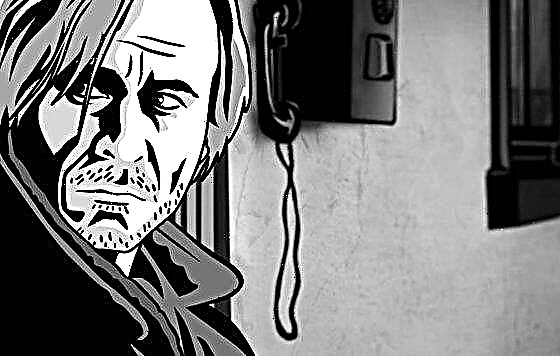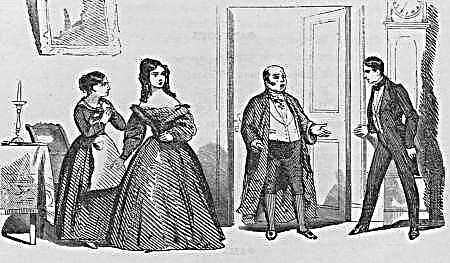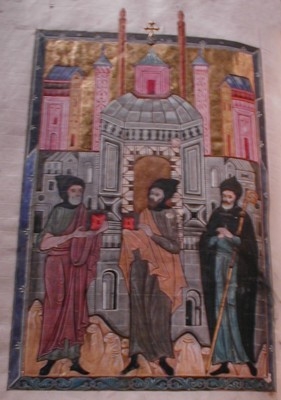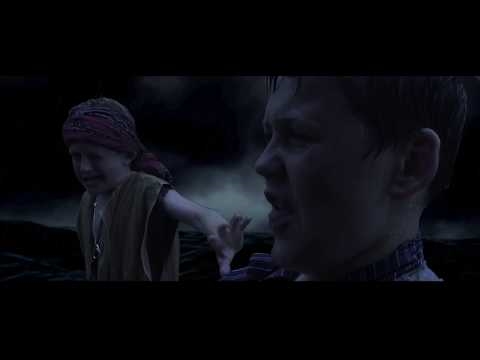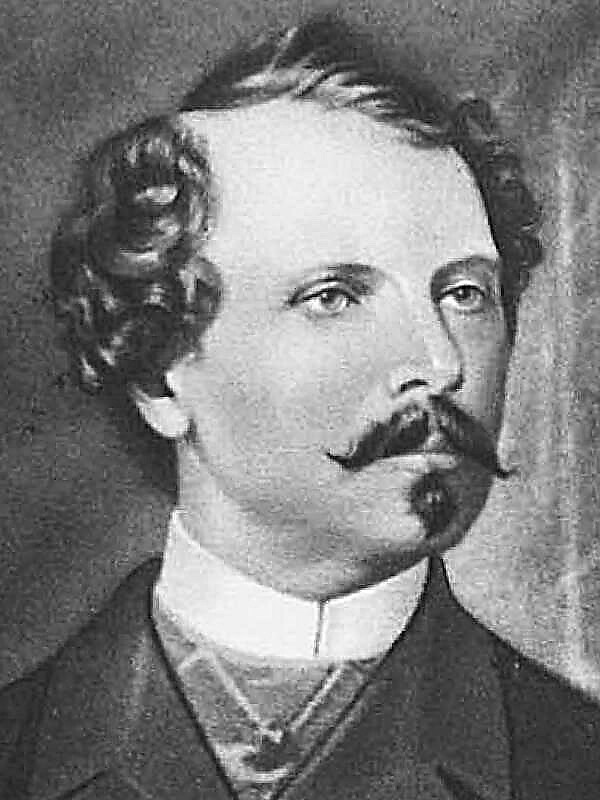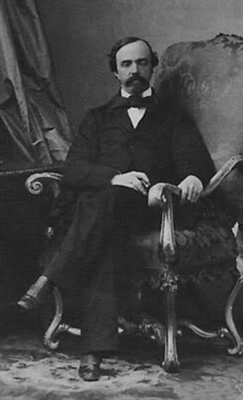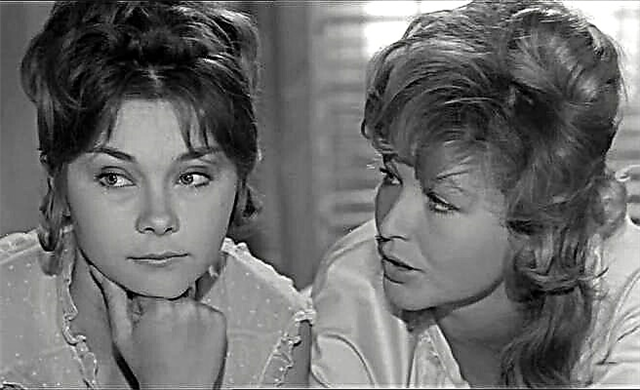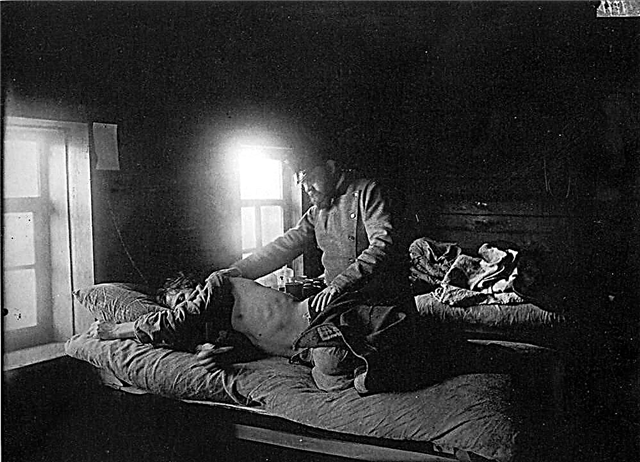Introduction
In the castle of Lourpe, several portraits of representatives of the family of Floressas des Essent have been preserved. These were portraits of powerful, harsh reitars and warriors. Of the portraits of subsequent representatives of the family, only the image “of a cunning and mysterious man with some lying, elongated face, slightly cheekbone cheekbones, reminded and intertwined with pearls hair, a long white neck in stiff collar assemblies” has been preserved. The degeneration of the genus continued. As if completing the work of time, des Essents for two centuries entered into marital unions within the family. In family marriages, the remnant of former power was lost.
From the family, once large, occupying almost the entire Ile de France, now there was only one offspring, “Duke Jean, a fragile young man of thirty years, anemic and nervous, with cold pale blue eyes, hollow cheeks, right, but with some kind of loose nose and hands dry and lifeless. According to some strange law of atavism, the last representative of the clan resembled an ancient ancestor, a handsome man, from whom he inherited an unusually light beard with a wedge and a double look - tired and cunning. ”
Jean's childhood was grim and passed in constant illness. He studied the young des Essent from the Jesuits. The monks didn’t particularly press on the boy, so his training was somewhat superficial: he “jokingly learned Latin, but he couldn’t connect two words in Greek, he didn’t show any abilities for modern languages, and in exact sciences even when he went through the very basics he turned out to be a complete dumbass < ...> he lived quite happily, barely noticing the care of his mentors; in his pleasure engaged in Latin and French; and, although theology was not part of the school curriculum, he completely improved in it, starting to study it even in the Lourpe castle according to the books passed to him from the cousin of great grandfather Don Prosper, abbot of Saint-Ruef. "
Upon returning from the boarding school, he did not meet with peers and increasingly thought of solitude. Love could save him, but the women were stupid and boring. He went into a rage, but could not stand his health and the doctors urged him to stop. Having counted the remaining money, des Essent was horrified: they were practically gone. “And he made up his mind: he sold the Lourpe castle, in which he had not been and of which he did not preserve either cheerful or sad memories; lost the rest of the property and bought state rents; thus secured an annual income of 50 thousand livres, and in addition, set aside a decent amount for the purchase and arrangement of his final haven. He traveled around the suburbs of the capital and in one of them, called Fontenay-o-Roses, at the outskirts, by the forest, he found a house. A dream came true: in a suburb flooded with Parisians, he found solitude. "
Chapter 1
After 2 months, des Essent was able to retire to the silence and grace of the fountain house and began to arrange it. He carefully thought out the colors he wanted to see and furnished the living room and study. “And des Essent came up with to tighten the walls of the office, like books, morocco, coarse-grained Moroccan leather that came out from under the thick steel plates of a powerful press. After the walls were finished, he ordered the skirting boards to be painted with varnished indigo - a dark blue paint, which carriages cover the crew panels, and with morocco go along the edge of the ceiling and tighten it so that it looked like an open dormer, sky blue, woven silvery angels, silk. This fabric was once made by the Cologne weaving association and was intended for church robes. ”
Chapter 2
It tells about how des Essent taught his servants to serve him inconspicuously, so that they were not visible at all, and also accustomed them to his regime: “Once and for all, he set a meal time; the dishes, however, were modest and unpretentious, since the sick stomach did not take food plentiful or heavy. At five in the evening, at dusk in the winter, he had breakfast: he ate two soft-boiled eggs, roast and drank a cup of tea; at eleven in the evening he dined; drank coffee at night, and sometimes wine or tea. Dinner des Essente had an easy, or rather, a snack at five in the morning, going to bed. " For days, des Essent indulged in dreams. He looked out the window, saw people passing by, noticed a stamp of dullness on their faces. He also believed that it was not necessary to travel, just imagine a journey.
Chapter 3
Description of the library des Essenta. It featured only those writers who, in the opinion of des Essent, wrote in their works about something depressing, decaying. His opinion of Latin-speaking writers was rather low: “gentle Vergil seemed to him a terrible, unbearable pedant, the first bore of antiquity. <...> I must say that, not particularly honoring Virgil and not liking the clear and plentiful Ovid, he endlessly and with all the heat of his soul hated Horace with his elephant grace, puppy yapping and clownish grimaces. As for prose, the abundance of verbs, flowery syllable, and the confused phrases of Gorokha-Vo-Rtu des Essent did not particularly appeal. <...> But Caesar, with his vaunted laconicism, liked him no more than Cicero, since in this extreme of a different kind was the dryness of the handbook, the tightness, unacceptable and inappropriate. Sallust, however, is still not as dull as the others, Titus Livius is too sensitive and arrogant, Seneca is pretentious and colorless, Suetonius is languid and immature. Tacitus, in its deliberate contraction, is the most nervous, sharp, most muscular of all. And as for poetry, neither Juvenal touched him at all, although he thoroughly had a rhyme or Persian, although he surrounded himself with mystery. He valued neither Tibullus with Propertius, nor Quintilian, nor both Plinius, nor Station, nor Martial Bilibilsky, nor Terence, nor even Plavt. ” Valued only Essent des Petronius, Apuleius, Commodian de Gaza. In general, the library of des Essenta included works up to the 10th century.
Chapter 4
Once in the evening, a carriage stopped at the house: it was a turtle brought. Des Essent decided that his carpets would look better if a tortoise crawled over them, whose shell was inlaid with gold and precious stones. Jean himself found the drawing and chose the stones (the description of the stones is given in great detail). However, it turned out that this venture was not very smart - the turtle died that evening.
Des Essent reflected on the fact that all tastes can be compared with musical instruments. He even had an “organ”, which in fact was a lot of bottles of wine with faucets. The owner could, with his help, “compose” cocktails. But today he did not want to compose. The taste of Irish whiskey reminded him of a story about how one day his tooth ached and he had to go to the dentist. I remembered that wild pain that he experienced when a tooth was pulled out.
Chapter 5
The entire chapter is devoted to paintings by des Essent. This is “Salome” by Gustave Moreau, where the heroine is a living embodiment of temptation and crime, “Revelation” on the same topic, only in the center is the already frozen look of the dead head of the Forerunner, aimed at the stunned Salome.
In the living room des Essent hung a series of engravings by Luiken “Persecution for Faith”, in the hallway - an engraving by Breden “Comedy of Death” and “The Good Samaritan”, as well as paintings by Odilon Redon.
Chapter 6
Dedicated to memories. The first is the case when a friend of Essenta’s D’Aegurand decided to marry. Everyone discouraged him, unlike des Essent, who encouraged this act, secretly expecting the couple to disperse. And so it happened. The second memory was Auguste Langlois (16 years old). Des Essent met him on the street and brought him to a brothel. There he paid the hostess a large sum and said that the boy can come here 2 times a week. When the money runs out, Auguste, according to the calculations of des Essent, will go to steal to get money to pay for comfort, and then he will kill someone. Des Essent cherished the dream of creating a killer in this way. But this either did not happen, or des Essent simply did not know about it.
Chapter 7
Des Essent abandoned reading and began to plunge into the past more and more. Waking up for a short while, he tried to head off into Latin, but again a flood of memories poured, this time for children. Des Essent remembered the Jesuits, he was drawn to faith. “However, he knew himself well and was sure that he was not capable of truly Christian humility or repentance.” Nevertheless, the Jesuits managed to instill in the Essent a love of the divine. Thanks to loneliness, she began to wake up in his soul. He began to resist, and Schoperhauer's philosophy helped him in this. Des Essent calmed down.
Chapter 8
Des Essent decided to buy flowers to decorate the house. He began to look for natural flowers that mimic artificial ones. When the plants were brought in, des Essent so breathed in their aromas that he had a nightmare about the carnivorous flower woman and the horseman of Syphilis.
Chapter 9
Reasoning about painters (Goya, Rembrandt). Reading Dickens and memories of lovers. A detailed story about one of the first, the circus of Urania. Des Essent longed for her because he imagined that she had many male habits. So he satisfied his attraction to brute masculine power. Then he slept with a ventriloquist, forcing her to speak in the voice of a man who allegedly caught them and threatened them with violence. Last, he remembered the young man with whom he also had a connection.
Chapter 10
An aggravated neurosis. Des Essent had hallucinations. Everywhere he smelled of the smell of frangipan (Italian perfume). To get rid of it, des Essent mixed several scents, creating perfume compositions. However, from the abundance of smells, his head ached and he fainted.
Chapter 11
Frightened, the servants ran after the fontaine doctor. But what kind of illness did Des Essent have, he did not understand. After muttering some medical terms, feeling the pulse of Des Essente and looking at his tongue, the doctor tried to return his speechlessness, but, having achieved nothing, prescribed a soothing and complete rest and said that he would visit him tomorrow. But des Essent shook his head, with all his might making it clear that he did not approve of the zeal of the servants and drove the stranger out. Des Essent decided to go to London, packed his bags and went to the Galignani’s Messenger to buy a guide. Having bought it, des Essent had dinner in the Bodega wine cellar, looking at visitors and imagining England. In the end, he decided it was time to return home.
Chapter 12
Going through his books, Des Essent recalled where he ordered the next copy, in which printing house he printed, which cover, paper, font he chose and why. Reasoning about Baudelaire, Villon, Agrippa d’ Aubigne. “With the exception of these few books, French literature in the library of des Essent began in the 19th century. It was divided into two parts: the first included secular literature; in the second - the church. " These are authors such as Lacorder, Count de Falloux, Vejo and others.
Chapter 13
It was getting hotter. The health of des Essenta worsened. He could not bear the heat, he could not eat, he was constantly sick. Once while relaxing in a park, des Essent watched a fight of village boys. Seeing one of them having a sandwich with white cottage cheese and onions, des Essent monstrously hungered. He ordered the servants to make him the same sandwich, but while they went to the village for groceries, des Essent felt bad again. Returning to the house, he saw an astrolabe that he used instead of a paperweight, and, remembering Paris, he began to talk about morality, protection and abortion.
Chapter 14
Once again, discussions about writers and literature. Favorite writers of Des Essentes are Flaubert, the Goncourt brothers, Zola, Baudelaire, Verlaine, Corbiere, Annon and Mallarmé. Des Essent comes to the conclusion that the ideal novel is “a novel in a few sentences - a squeeze of hundreds of pages with their image of the environment, characters, pictures of morals and sketching of the tiniest facts. These will be words so carefully selected and capacious that they will make up for the absence of all the others. The adjective will become so transparent and precise that it will tightly grow into a noun and open the boundless perspective to the reader; it will allow for weeks to dream and guess over its meaning - both narrow and wide; and reveal the soul of the characters entirely: outline in the present, restore in the past, provide in the future. And all this thanks to a single definition. A one-two-page novel will make possible the co-creation of a masterfully pen-writing writer and an ideal reader, spiritually bring together those few beings of a higher order that are scattered in the universe, and give these chosen ones a special, accessible pleasure for them. Des Essenta is again tormented by pains in the stomach, and every day the servant cooks the broth for him according to a special recipe.
Chapter 15
However, after a while, the broth ceases to help. Exhausted by auditory hallucinations, des Essent calls the doctor. In anticipation of his visit, he is angry, sometimes tormented by the fear of death. The doctor who arrived at last strongly recommends eating well. However, nausea does not allow this. And then the doctor offers an enema, from which des Essent is delighted. “His thirst for artificiality was now, even against his will, fully satisfied. Nowhere more complete. Artificial nutrition is the limit of artificiality! ” After that, the doctor insisted on a change of residence and a return to a “normal” life in Paris.
Chapter 16
Des Essent packed up. He did not want to leave the house and he distracted himself with thoughts about the discord in the church over wine, which was diluted, and bread, which was baked not from wheat, but from starch. The novel ends with a passionate prayer to the Lord for patronage.


